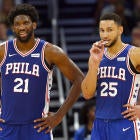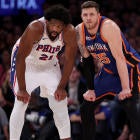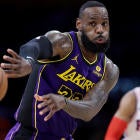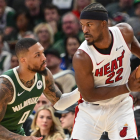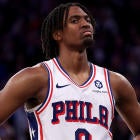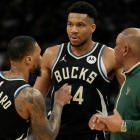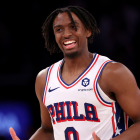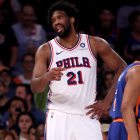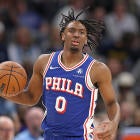
When an NBA head-coaching job opens up, it usually looks something like the 2020 Chicago Bulls. New management attempting to put their own stamp on a relatively young franchise still somewhat malleable in its identity. Jobs like these are, essentially, entry-level compared to the ones that don't open up. Typically, these teams hire first-timers and younger retreads because contenders can hire a class of coach that rebuilders don't have access to. Ty Lue has a championship ring. Good luck convincing him to spend three years in the lottery.
But this year's class is the opposite. The Bulls are the only true rebuilder in the market for a coach. Every other team with a current opening expects to compete for championships either right now or in the very near future, and those teams seem to have somewhat similar tastes. Lue has already been linked to all three non-Chicago openings: the Brooklyn Nets, Philadelphia 76ers and New Orleans Pelicans. Well-regarded assistant Ime Udoka reportedly has interest from the Nets and 76ers (with whom he spent the 2019-20 season), while former Bucks coach Jason Kidd is a candidate with both the Nets (for a second go-round) and Pelicans.
There is a reasonable chance that some coach, most likely Lue, has his pick of multiple opportunities. Normally, the chance to coach any one of these teams would be irresistible, but this cycle happens to include three of them. That begs an important question: if someone has offers from multiple contenders, which job should he take? Leaving the rebuilding Bulls out of the picture, let's go through the major factors involved in a job's desirability and attempt to rank them.
Immediate talent
- Brooklyn
- Philadelphia
- New Orleans
There are two conversations at play here: star-level talent and overall roster talent. Brooklyn wins the superstar race. Kevin Durant is the best player on any of these three teams, and Kyrie Irving is no lower than fourth and potentially as high as second. Both have won championships as at least co-primary ball-handlers, and their fit together, while hardly symbiotic, does not come with the sort of stylistic limits that the union of Ben Simmons and Joel Embiid create. As problematic as that 76ers duo is, they are far closer to their primes than the Zion Williamson-Brandon Ingram pairing, which, as we saw both before and in the bubble, makes more sense in theory than in practice. There is a universe in which Williamson and Ingram fit like gloves next season and both take meaningful steps. That could propel New Orleans past Philly in star-level talent, but for now, the Sixers get the nod.
The star rankings are what ultimately dictated the overall rankings here, but the broader roster pictures are far more interesting. Brooklyn probably has the most non-star talent as well, but it's incredibly redundant. Spencer Dinwiddie and Caris LeVert aren't going to control the ball with Durant and Irving back, though one or both could be flipped. Jarrett Allen and DeAndre Jordan overlap as well, and the Nets would likely prefer to have a small-ball option in-house. Joe Harris fits with anyone, but the rest of the rotation needs some clarity.
The Philadelphia question is so fascinating because there's the question of how the Sixers role players fit with their stars, but also how their role players fit with one another. Would Tobias Harris and Josh Richardson, for instance, both be better served with an elite shooter in the other's slot? Could Al Horford play power forward next to Embiid if Shake Milton grew into a more consistent, traditional ball-handler?
And then there's New Orleans, whose talent spans the entire age curve, but undeniably fits well with Williamson. The chemistry between he and Lonzo Ball was instant. JJ Redick fits with everybody, but especially players whose gravity draws defenses toward the basket. That fit gives the Pelicans a slight edge over Philadelphia in the role player department, but given the outsize importance of superstars, it isn't enough to surpass Simmons and Embiid
Health
- Philadelphia
- Brooklyn
- New Orleans
Yes, somehow, the Philadelphia 76ers are the healthiest team in a group. Don't expect them to ever repeat that feat. The argument behind it is that, while both Simmons and Embiid have dealt with injuries in recent years, none have been catastrophic. Embiid missed the first two seasons of his career, but has missed only around 20 games per year since while largely being healthy during the postseason. Simmons missed his rookie year, but then missed only four total regular-season games in the next two. His injuries this year, while concerning, don't figure to hamper him next season. There are still serious concerns, but for the time being, the 76ers should feel relatively secure in the idea that their health issues are not debilitating.
Brooklyn's might be. The list of players to successfully come back from a ruptured Achilles tendon and play at their previous levels is brief. Durant might match Dominique Wilkins. He might fall off a cliff like Kobe Bryant or DeMarcus Cousins. Odds are, he lands somewhere in between, but the downside risk is greater than Simmons and Embiid for the moment. Irving played only 20 games this season, missed the majority of an NBA Finals and a playoff run to the Eastern Conference finals and has played 70 games in only three of his nine NBA seasons.
The important distinction between Brooklyn and New Orleans, though, is that the Nets only need to stay healthy once. Their window is short and one championship justifies this entire roster construction. Durant and Irving might have injury-riddled careers, but if the Nets can have them together for one playoff run, a title is a strong possibility. Both have survived multiple extended runs in the past.
The New Orleans situation is more complex. The Pelicans need to keep Zion healthy for years, and he has no proven track record of making it through a season. They aren't ready to contend for championships yet, but they can't just put him on ice until they are. He is going to play in games, and given his injury history and unusual playing style, there is a meaningful chance he develops recurring issues. The Pelicans don't just need to him going for one year. They need to overhaul elements of his entire playing style and body to create more sustainable stardom. Williamson might be healthier next season than Durant and Irving, but the odds of him getting hurt at some point between now and when the Pelicans can contend for real is so high and could have such far-reaching consequences that New Orleans has to be at the bottom of this list.
Flexibility
- New Orleans
- Brooklyn
- Philadelphia
The Pelicans have star upside with Zion, yes, but they also have the ability to pivot away from him if need be. Say his injury problems persist. That likely puts the Pelicans near the top of the draft, where they were before he returned. That's another bite at the superstar apple that likely doesn't come at the coach's expense, as generally, they aren't blamed for injury-induced poor performance. Their war chest of draft picks gives them the ability to trade for almost anyone. While Brandon Ingram is likely to get a max extension this offseason, currently, the Pelicans have very little long-term money on their books. They can build for multiple different timelines and adjust to whatever circumstances are thrown their way. In short, they can be opportunistic. Brooklyn and Philadelphia are operating within much tighter lines.
The Nets have adaptability, but only within the context of their existing framework. They can't simply pivot away from Durant and Irving. That duo is set in stone. But with LeVert, Dinwiddie and Allen, they have the chips to go find either a third star or virtually whatever sort of role players they'd like around their superstars. Their roster is going to look different next season, and the pieces around Irving and Durant will be chosen with intention. The Nets can put the team they want around them.
That's a luxury the 76ers might not have. Assume Simmons and Embiid are staying put. Tobias Harris and Al Horford are virtually untradeable given their contracts, except perhaps for equally expensive players (and Chris Paul makes a ton of sense if Philly is willing to cough up some other goodies). Josh Richardson went from a viable centerpiece in a Jimmy Butler deal to a borderline bench player in one year. The only chip the 76ers really have to cash in right now is Matisse Thybulle, but possible Defensive Player of the Year candidates that can shoot don't grow on trees. Giving him up from a position of desperation would hardly be ideal.
Of course, the 76ers could give themselves significantly more flexibility by dangling Simmons or Embiid, but unless they get a star back, the talent that makes them special would end up being sacrificed for far more common fit. Two stars should be better than one, but right now, the 76ers are testing that theory. If a new coach can't fix their issues in a year or two, that duo could easily be broken up, and given the uncertainty inherent to such a restructuring, Philadelphia has to be at the bottom of this list.
Management
- New Orleans
- Brooklyn
- Philadelphia
David Griffin's success in Cleveland (and so far in New Orleans) is nice, but this isn't Masai Ujiri we're talking about. Griffin is a good general manager. What makes the New Orleans situation great is ownership's renewed commitment to the team. Griffin managed to hire Aaron Nelson, one of the NBA's best health gurus, away from the Phoenix Suns last offseason. He stole general manager Trajan Langdon away from the Nets while he was at it, and capped their offseason overhaul with practice facility upgrades. A smart executive means nothing without backing from ownership. With Griffin at the helm, Gayle Benson has made a genuine commitment to building a winning organization. That doesn't guarantee anything, but it's the right process.
Brooklyn has made similar below-the-line commitments, and Sean Marks might even have a better resume than Griffin. But the Nets have a variable that, to this point, the Pelicans do not: their stars. The Nets telegraphed their commitment to placating their stars in firing Kenny Atkinson. When Jacque Vaughn took over as the interim coach, his first move was to put DeAndre Jordan, Durant and Irving's close friend, into the starting lineup. That move was undeniably the wrong one in the long run. The 22-year-old Allen has a far brighter future than the 32-year-old Jordan, and may even be a better player right now. But what stars want and what teams want don't always align. The Pelicans, for the time being, appear able to operate with impunity. Rookie contracts buy teams time in that respect. The Nets have no such luxury.
The 76ers are the easy team to peg. Their front office is a disaster. They cycled through three general managers during Brett Brown's coaching tenure -- four if you include Brown's interim post running basketball operations. There will reportedly be restructuring underneath general manager Elton Brand, who appears safe for the time being. Whether or not he should be is a valid question. He guaranteed Horford and Harris $277 million over the summer. Jimmy Butler got around half of that to be an All-NBA player for Miami. Redick got less than 10 percent of it and was better than either this season. The 76ers' chain of command is constantly in flux. Even when there's clarity, this group has shown no capacity to build sensibly around Embiid and Simmons. They are on the bottom by a mile here.
Runway
- Philadelphia
- New Orleans
- Brooklyn
The advantage of Philadelphia's front-office issues is job security. If things go wrong after hiring a new coach, Brand's head will be next on the chopping block. If Brown can survive three regimes over seven years, ownership will like afford his replacement at least a degree of that security. The Simmons-Embiid situation provides a similar scapegoat. Surely their 2020 hire will get to coach the 2022 or 2023 team that only includes one of them, should the team ever reach that point.
New Orleans provides theoretical job security given the team's youth, but David Griffin has an itchy trigger finger. He fired David Blatt during only his second season in Cleveland, with a record of 30-11 and coming off an NBA Finals appearance. He pulled the plug on Alvin Gentry only a year after extending his contract. Griffin is not sentimental. He isn't the sort of GM that waits around and hopes things change magically. If he sees the need for a new voice, he will be proactive in finding it.
Brooklyn is the wildcard here simply by virtue of its timeline. The Nets have two aging stars under contract for only two more years. Ideally, things go well enough that they don't need to hire a new coach anytime soon. But given the realistic possibility of a slow start with an injury prone and possibly overhauled roster, nothing should be ruled out. Atkinson didn't appear to be on the hot seat until he was already fired. The Nets aren't going to waste what's left of Durant's prime. If their hire doesn't work immediately, the rumors will start swirling quickly.
The wild card
At this point, we need to address the elephant in the room. There is a fourth possible contender that currently has a head coach, but won't as soon as their playoff run ends: the Houston Rockets. Mike D'Antoni has been on the hot seat all season. The team let go of many of his assistants after last season, and reports have suggested that he needs a deep playoff run to save his own job. Even if he goes on one, there is no guarantee that he returns to Houston. His contract expires after the season. If either side wants out of this arrangement, the Rockets will be in the market for a new coach.
That does a number of things to the coaching market as a whole. First and foremost, it makes D'Antoni a viable candidate for any of these teams, and he has ties to all of them. D'Antoni worked with Griffin in Phoenix. He revived his coaching career as an assistant under Brown in Philadelphia before landing the Houston job. He coached Durant in the 2012 Olympics, and he spent time in New York as coach of the Knicks. He could theoretically fit with any of them.
Second, it adds the Rockets into the fray as a contender for many of the same coaches these teams are pursuing, and in many ways, they are just as attractive. While Durant at his peak is a better player than James Harden, Harden's health makes him the safer star to build around. The Rockets have a flawed but innovative roster that coaches would likely be interested in molding. But they are likely to have luxury tax issues next season, especially with the pandemic impacting owner Tilman Fertitta's other business so greatly. Their financial commitment to winning is going to be put to the test in the coming years.
Their possible presence on the market creates the potential for some fascinating gamesmanship. The Rockets, by virtue of still being alive while these other teams have been eliminated, are closer to a championship than any of them. In theory, that makes Houston the most desirable job available ... if it becomes available. That forces candidates into a difficult choice. Should the Rockets' playoff run last a while longer, would any of them be willing to turn down other jobs in order to wait out the Houston situation?
There's no easy answer here, but until there's resolution on the Houston front, the Rockets need to be considered among the jobs that are actually open. Even if the job doesn't open up, the fact that it might will no doubt impact how certain coaches approach the carousel.
The verdict
- New Orleans
- Brooklyn
- Houston
- Philadelphia
It should be stressed here that different coaches are going to have different preferences. Someone like Jay Wright, an institution at Villanova, would likely prefer to remain in Philadelphia with the 76ers than uproot his entire life to head south for New Orleans. It's entirely possible that a coach picking between two of these jobs takes the lower-ranked opportunity. These are on-paper rankings. They exist in a vacuum. Context will dictate the choices the actual candidates make.
But when roster talent and money are relatively even, most coaches are going to make long-term decisions. That means factoring in a combination of expected job security and future flexibility. Even with the risks Zion poses, the Pelicans are so young and have so many assets to work with that the odds of them not reaching at least sustained competitiveness are extremely slim. Pair that with the upside and creative challenge of working with Zion, and New Orleans offers the best long-term package for the average coach.
Brooklyn and Houston are relatively similar, and could theoretically be flipped on this list depending on risk-tolerance. The Rockets are what they are. The Nets have a chance to be a good deal better, or a good deal worse. Both would come with immediate pressures. But the Nets have optionality that offers coaches an escape should the roster fundamentally not work. If a coach doesn't fit with Houston's talent, they're out of luck. The Rockets don't have many picks to trade, and they're years away from cap flexibility. Most coaches would probably prefer not to box themselves in like that without feeling extremely confident in the existing group. Some candidates might have that faith.
And then there's Philadelphia, where uncertainty reigns supreme. The Sixers' next coach is likely to last several years by virtue of organizational philosophy. It's also hard to get fired winning 50 games every year, which is going to be the outcome this roster produces despite its flaws. But stepping into a situation in which neither the GM nor the two stars are guaranteed to be there in two years as just too precarious for most risk-averse coaches. There's still plenty of upside to that job, and in a normal year it would be the best on the market. But in competing with these other destinations, the 76ers will have their work cut out for them.













